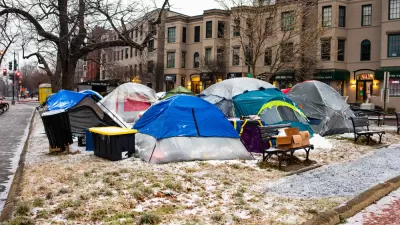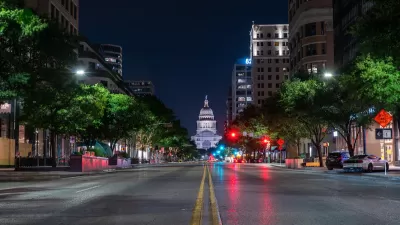Just months after the Biden administration released a blueprint for ending homelessness focused on ‘person-centered’ solutions, federal officials are forcefully displacing unhoused people in encampments around the District.

After federal and District of Columbia officials displaced the residents of a homeless encampment located just blocks from the White House, critics are accusing the Biden administration of going against its own stated policy, which, on paper, emphasizes “equity, inclusion, and ‘person-centered, trauma-informed, and evidence-based solutions to homelessness’.” Writing in Bloomberg CityLab, Kriston Capps describes the sweep of McPherson Square, which happened months before the District originally said it would.
The strategic plan to fight homelessness released by the White House two months ago strongly denounces police sweeps of homeless encampments. “The White House urged officials to instead tap into the resources made possible by pandemic relief bills to connect those in need with permanent supportive housing.”
Advocates for unhoused people point to the hypocrisy of the actions undertaken by the National Park Service and D.C. officials. “The tent city in DC’s McPherson Square had grown in recent weeks following a wave of evictions in other Washington parks, including several on the archipelago of small circles and triangle plots controlled by NPS throughout the city.”
D.C. Mayor Muriel Bowser blamed safety concerns for the action, but critics reject that reasoning. “The dangers faced by people sleeping outdoors, advocates say, makes an urgent case for finding them supportive housing solutions — but not for removing them.” The federal plan itself categorically states that sweeps don’t work. “Asked about the discrepancy, USICH said in a statement that ‘the federal strategic plan to prevent and end homelessness encourages communities to close encampments in a coordinated, humane, and solutions-oriented way that treats homelessness like a housing and health crisis.’”
FULL STORY: Biden Administration Defies Own Playbook on Homelessness

Montreal Mall to Become 6,000 Housing Units
Place Versailles will be transformed into a mixed-use complex over the next 25 years.

Planetizen Federal Action Tracker
A weekly monitor of how Trump’s orders and actions are impacting planners and planning in America.

DARTSpace Platform Streamlines Dallas TOD Application Process
The Dallas transit agency hopes a shorter permitting timeline will boost transit-oriented development around rail stations.

Study: 4% of Truckers Lack a Valid Commercial License
Over 56% of inspected trucks had other violations.

Chicago Judge Orders Thousands of Accessible Ped Signals
Only 3% of the city's crossing signals are currently accessible to blind pedestrians.

Philadelphia Swaps Car Lanes for Bikeways in Unanimous Vote
The project will transform one of the handful of streets responsible for 80% of the city’s major crashes.
Urban Design for Planners 1: Software Tools
This six-course series explores essential urban design concepts using open source software and equips planners with the tools they need to participate fully in the urban design process.
Planning for Universal Design
Learn the tools for implementing Universal Design in planning regulations.
City of Mt Shasta
City of Camden Redevelopment Agency
City of Astoria
Transportation Research & Education Center (TREC) at Portland State University
US High Speed Rail Association
City of Camden Redevelopment Agency
Municipality of Princeton (NJ)





























